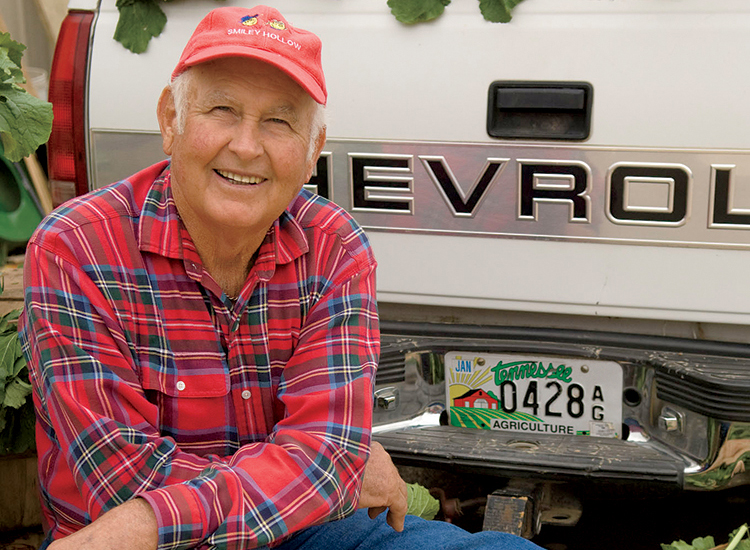Home > Tennessee > Tennessee Ag Education > Ag Tag Boosts Ag Education in Tennessee
Ag Tag Boosts Ag Education in Tennessee
In partnership with: Tennessee Department of Agriculture

Even if you’re not driving down a country road in Tennessee, there are plenty of red barns to admire. Since 1996, the “Ag Tag” license plate, which features a red barn, has illustrated support for local agriculture, and sales from this farm-themed plate go to the state’s Agricultural Development Fund, administered by the Tennessee Department of Agriculture.
Thanks to Ag Tags, a quarter of a million dollars is given back annually to the agriculture community in the form of grants to agricultural youth organizations and a variety of agricultural projects and programs across the state.
In 2003, Ag Tags (and its resulting Ag Development Fund) reached its first milestone granting more than $1 million to Tennessee’s ag community since the tag’s inception. By 2009, the $2 million mark was hit and now, 2016 marks the 20th anniversary celebration of the popular red barn tag.
One reason the Ag Tag program has been so successful is that it’s the only tag with a fund committed to supporting organizations other than itself, focusing funds outwards toward the agriculture community. For example, Ag Tag sales provide a combined $165,000 annually to Tennessee’s 4-H, FFA and Agriculture in the Classroom (AITC) programs.

Ag Tag Boosts Ag Youth Resources
“The Ag Tag fund has helped us further establish endowments that help support 4-H county programs, like providing more scholarships,” says Justin Crowe, extension specialist with Tennessee 4-H Youth Development.
Additionally, events like livestock expositions, 4-H Roundup and 4-H Congress, where students visit legislators in Nashville and learn about state government, have all benefited from increased funding.
Another area expanding because of Ag Tags is volunteer development.
“We could not have a strong program in Tennessee without the support of all our volunteers, who are out every day meeting 4-H clubs at the schools and training judging teams,” Crowe says.
As of 2015, 4-H has received more than $750,000 since Ag Tags hit the roads.
“These funds have helped bring competitions, activities, events and teams to a level that we can really be proud of, and we know it wouldn’t be at that level without the support of Tennessee’s Department of Agriculture and Ag Tags,” Crowe says.
Buying Ag Tags also supports Tennessee’s FFA, which has 14,084 members, 322 advisors and 216 chapters. Allie Ellis, career and technical education specialist for FFA, sees numerous benefits.
“Ag Tag funds help sponsor state- winning Career Development Events (CDE) teams and individuals, Tennessee’s FFA breakfast at National Convention, FFA forestry camp, Blast-Off state officer training, the National Leadership Conference for State Officers, regional officer leadership training, and the state FFA degree pins and ribbons,” she says.
These additional resources make a positive difference in students’ education. Similarly, Ag in the Classroom, which provides professional development for the state’s classroom teachers, spends Ag Tag funds in support of summer workshops at 10 locations statewide.
“With the support of Ag Tags, AITC trained more than 1,400 teachers in 2014. That’s a 418 percent increase over the 270 trained in 1997 before Ag Tag funding,” says Dan Strasser, Tennessee Farm Bureau, special programs director.
![Ag Tag [INFOGRAPHIC]](https://eadn-wc01-4177395.nxedge.io/wp-content/uploads/2020/08/Screen-Shot-2016-03-14-at-4.00.36-PM.png)
Looking at the Road Ahead
According to the USDA, the U.S. produces only one qualified candidate for every two jobs in agriculture that require a college degree.
“4-H, FFA and AITC make students aware of the broad scope of careers available in agriculture. This knowledge increases the odds that some students will pursue a career in agriculture through post- secondary education,” ultimately leading to an agriculturally literate population, Strasser says.
Crowe agrees. “We feel strongly that all of our young people are advocates for agriculture and are shaping the industry’s future. The training they’ve received will help them tremendously now and down the road.”
As before, community support is vital to the Ag Tag program’s success and ability to advance local agriculture.



